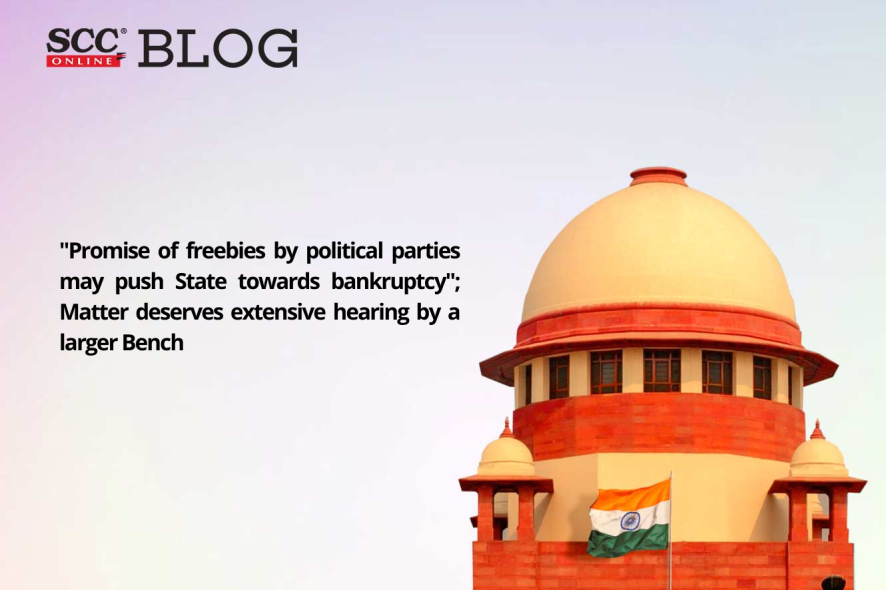Supreme Court: The 3-judge bench of NV Ramana, CJ and Hima Kohli and CT Ravikumar, JJ has referred, the matter relating to promise of freebies by political parties as a part of their election manifesto or during election speeches, to a larger Bench after observing that,
“Freebies may create a situation wherein the State Government cannot provide basic amenities due to lack of funds and the State is pushed towards imminent bankruptcy. In the same breath, we should remember that such freebies are extended utilizing tax payers money only for increasing the popularity of the party and electoral prospects.”
The petitions have been filed on the premise that such pre-election promises, which have a largescale impact on the economy of the State, cannot be permitted. These pre-election promises are being made by political parties without any assessment of the financial implications on the State is nothing but an attempt to attract the vote bank. This goes against the spirit of responsible electioneering and is adversely affecting free and fair elections. This severely affects the level playing field between the different political parties. The money that is being paid by the taxpayers is ultimately being misused for political parties/candidates to gain or retain power.
Solicitor General Tushar Mehta submitted before the Court that the Union of India has a very limited role when it comes to this issue. Even the Election Commission of India has limited scope to interfere in such promises which are being made by political parties/candidates. Hence, it was suggested that the Court may constitute a Commission to consider the issue.
Some political parties objected the very maintainability of these petitions on the ground that the issues raised in these petitions relate to policy or fiscal decisions of the State, which decisions are clearly outside the scope of the Court’s jurisdiction. Submitting that the issue must be left open to the political parties, it was argued,
“It is unimaginable that any Government or Court can prescribe or curtail the rights of political parties to make such promises or announcement of schemes. The political parties which are responsible for running of the Governments are conscious and aware of the problems of the people. It was, therefore, contended by the interveners to leave the issue open to the political parties.”
Some intervenors also argued that all promises cannot be equated with freebies as they relate to welfare schemes or measures for the public good. Not only are these a part of the Directive Principles of State Policy, but are also a responsibility of the welfare state.
Senior Advocate Kapil Sibal, who’s opinion was sought by the Court, was initially of the opinion that this is a serious issue which needs to be tackled in some manner. However, subsequently, he also expressed his doubts about the appropriateness of judicial intervention on the issue.
Taking note of the issue and the submissions, the Court observed,
“There can be no denying the fact that in an electoral democracy such as ours, the true power ultimately lies with the electorate. It is the electorate that decides which party or candidate comes to power, and also judges the performance of the said party or candidate at the end of the legislative term, during the next round of the elections.”
The Court stressed on consideration of the worry of the petitioners that under the guise of electoral promises, fiscal responsibility is being dispensed with, must also be considered.
It is important to note that in S. Subramaniam Balaji v. State of Tamil Nadu, (2013) 9 SCC 659, the Court held that the preelection promises do not fall within the ambit of corrupt practices as specified under Section 123 of the Representation of the People Act, 1951, and issued directions to the Election Commission of India regarding framing of certain guidelines, in the absence of any legislative enactment covering the field.
In the case at hand, it was argued before the Court that the reasoning in the S. Subramaniam Balaji judgment is flawed as it has not considered various provisions of the Representation of the People Act, 1951 and that it also incorrectly implies that the Directive Principles of State Policy can override the fundamental rights under Part III of the Constitution, which is against the law settled by a Constitution Bench of this Court in Minerva Mills Ltd. v. Union of India, (1980) 3 SCC 625.
The Court, hence, held that the issue requires an extensive hearing before any concrete orders can be passed. It hence, framed the following issues and referred the matter to a 3-judge bench as the judgment in S. Subramaniam Balaji was delivered by a two-Judge Bench:
- What is the scope of judicial intervention with respect to the reliefs sought in the present batch of petitions?
- Whether any enforceable order can be passed by this Court in these petitions?
- Whether the appointment of a Commission/Expert Body by the Court would serve any purpose in this matter? Additionally, what should be the scope, composition, and powers of the said Commission/Expert Body?
- Whether the judgment in S. Subramaniam Balaji requires reconsideration?
[Ashwini Kumar Upadhyay v. Union of India, 2022 SCC OnLine SC 1098, order dated 26.08.2022]






